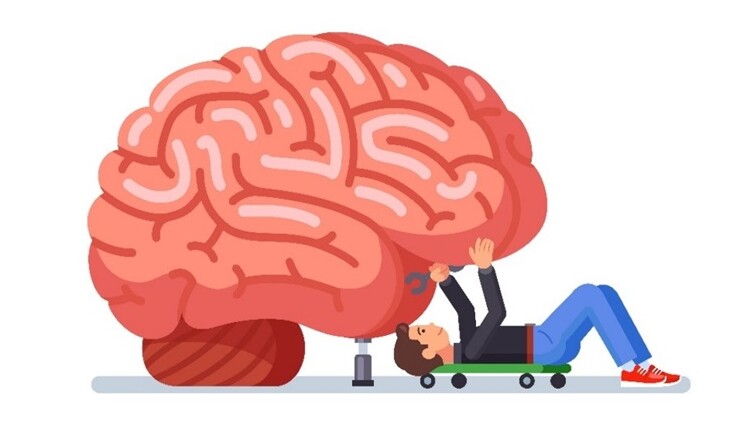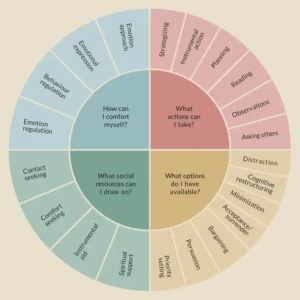SCARS 5 Coping Techniques For Traumatized Scam Victims
Authors:
• Vianey Gonzalez B.Sc(Psych) – Licensed Psychologist Specialty in Crime Victim Trauma Therapy, Neuropsychologist, Certified Deception Professional, Psychology Advisory Panel & Director of the Society of Citizens Against Relationship Scams Inc.
• Tim McGuinness, Ph.D. – Anthropologist, Scientist, Director of the Society of Citizens Against Relationship Scams Inc.
SCARS 5 Coping Techniques for Traumatized Scam Victims – Navigating the Aftermath
Being scammed can be a deeply unsettling experience, leaving you feeling violated, confused, and unsure of where to turn. The emotional impact can be profound, leading to anxiety, depression, sleep disturbances, and even post-traumatic stress disorder (PTSD). While the path to healing isn’t always linear, there are effective coping techniques you can embrace to navigate the aftermath and rebuild your sense of well-being.
Coping Techniques for Scam Victims: Healing Steps for Emotional Recovery
When you’ve been through the distress of a scam, healing isn’t always easy. The impact can be profound, affecting mental health, well-being, and the ability to navigate everyday life. But amidst the difficulties, there are steps you can take to support your emotional recovery. If you’re feeling overwhelmed, struggling with mental health, or awaiting treatment, here are some gentle yet effective coping strategies:
Coping Techniques 1: Reach Out in Crisis
First and foremost, if you’re in crisis, support is available. Call or text 988 or reach out through 988lifeline.org to connect with a trained crisis counselor at any time of day or night. Seeking help in moments of distress is a courageous step toward healing.
Coping Techniques 2: Acknowledge and Accept
The next step is acknowledging the trauma. Don’t minimize your experience or dismiss your emotions. Allow yourself to feel the anger, sadness, and fear; bottling them up will only prolong the healing process. Be kind to yourself and accept where you are in this journey. Healing takes time, and there will be bumps along the road, but remember, you are not alone.
Understand that where you are right now is okay. Healing isn’t a linear journey; it involves peaks and valleys. Offer yourself kindness and understanding as you would to a dear friend facing similar challenges.
Coping Techniques 3: Prioritize Self-Care
Trauma takes a toll on your body and mind. Prioritizing self-care becomes crucial for restoring balance and resilience. This includes:
- Physical well-being: Aim for regular sleep, nutritious meals, and exercise. Even a short walk or gentle stretching can make a difference.
- Emotional well-being: Explore healthy outlets for your emotions. Journaling, creative expression like writing or drawing, or mindfulness practices like deep breathing can help you process and release negative emotions.
- Mental well-being: Limit your exposure to news or social media if it triggers anxiety. Instead, engage in activities you enjoy, rediscover old hobbies, or pick up new ones. Maintaining a regular schedule can provide a sense of structure and stability.
Nurturing Your Body and Mind
Taking care of yourself is an essential part of the healing process. Self-care varies from person to person, so explore different practices until you find what resonates with you.
- Body Care
- Prioritize adequate sleep and aim for a consistent sleep schedule if possible.
- Safely spend time outdoors, soaking in nature’s calming influence.
- Engage in physical activities you enjoy, whether it’s playing sports or simple exercises like stretching or walking.
- Mind Care:
- Express your feelings through writing or drawing; it can be a therapeutic outlet.
- Practice deep breathing exercises to ease your mind and slow your heart rate.
- Limit exposure to distressing news or social media content if it adds to your stress.
- Exploring Interests and Finding Joy – Engaging in activities you love can be profoundly healing:
- Develop a daily routine that works for you and factor in moments for relaxation.
- Acknowledge and celebrate both small and significant achievements along your journey.
- Seek connections and support from others.
Coping Techniques 4: Connect and Seek Support
Reach out to your support network. Talk to friends, family, or anyone you trust about your experience. Joining a support group specifically for scam victims can connect you with others who understand what you’re going through and offer valuable advice and encouragement. Don’t be afraid to seek professional help if needed. Therapists can provide tools and strategies for managing PTSD symptoms and coping with the emotional aftermath.
Building Support and Connection:
- Consider seeking help when you feel ready to take that step.
- Join a SCARS support group or connect with an online community where you feel safe. Sign up at support.AgainstScams.org
- Share your feelings with non-judgmental individuals who genuinely care about you.
- If safe, communicate openly with your partner about your experiences.
- Engage in social activities or volunteer work that align with your interests and values.
In times of crisis or when you simply need someone to talk to, don’t hesitate to call or text 988 for immediate support in the U.S. or Canada.
Coping Techniques 5: Celebrate Small Wins
Healing is a journey, not a destination. Acknowledge and celebrate your progress, no matter how small. Every positive step counts, whether it’s waking up feeling slightly less anxious, enjoying a moment of laughter, or simply getting through the day without relying on unhealthy coping mechanisms.
This was not your fault and you are not alone. There are resources below available to help you cope and heal.
Remember!
By actively engaging in self-care, seeking support, and celebrating your progress, you can gradually navigate the aftermath of being scammed and rebuild your life on a foundation of strength and resilience. Remember, you are stronger than the trauma you endured, and brighter days lie ahead.
Also, healing is a unique journey for each individual. By practicing self-care, seeking support, and allowing yourself space for emotional recovery, you’re taking crucial steps toward reclaiming your well-being and resilience after experiencing the distress of a scam.
More:
- Therapy & Resources:
- National Center for PTSD: https://www.ptsd.va.gov/
- National Alliance on Mental Illness (NAMI): https://www.nami.org/Home
- Crisis Text Line: Text HOME to 741741
- National Suicide Prevention Lifeline: Call or text 988
- Worldwide Crisis Hotlines: International Suicide Hotlines – OpenCounseling : OpenCounseling
- More Articles to Help:
- Fibromyalgia & Psychological Trauma Link – Medical Health Alert – 2023 (scamsnow.com)
- Trauma Recollection/Traumatic Flashbacks And Scam Victim PTSD – Recovery Psychology – 2023 (scamsnow.com)
- Fear Of Contagion: Why Scam Victims Are Harshly Judged And Blamed 2023 (scamsnow.com)
- Toxic Self-Narratives That Feeds Depression in Scam Victims 2023 (scamsnow.com)
- The Psychology of Scams (romancescamsnow.com)
SCARS Resources:
- For New Victims of Relationship Scams newvictim.AgainstScams.org
- Subscribe to SCARS Newsletter newsletter.againstscams.org
- Sign up for SCARS professional support & recovery groups, visit support.AgainstScams.org
- Find competent trauma counselors or therapists, visit counseling.AgainstScams.org
- Become a SCARS Member and get free counseling benefits, visit membership.AgainstScams.org
- Report each and every crime, learn how to at reporting.AgainstScams.org
- Learn more about Scams & Scammers at RomanceScamsNOW.com and ScamsNOW.com
- Global Cyber Alliance ACT Cybersecurity Tool Website: Actionable Cybersecurity Tools (ACT) (globalcyberalliance.org)
- Self-Help Books for Scam Victims are at shop.AgainstScams.org
- Donate to SCARS and help us help others at donate.AgainstScams.org
- Worldwide Crisis Hotlines: International Suicide Hotlines – OpenCounseling : OpenCounseling
- Campaign To End Scam Victim Blaming – 2024 (scamsnow.com)
-/ 30 /-
What do you think about this?
Please share your thoughts in a comment below!
More ScamsNOW.com Articles
-/ 30 /-
What do you think about this?
Please share your thoughts in a comment above!
SCARS LINKS: AgainstScams.org RomanceScamsNOW.com ContraEstafas.org ScammerPhotos.com Anyscam.com ScamsNOW.com
reporting.AgainstScams.org support.AgainstScams.org membership.AgainstScams.org donate.AgainstScams.org shop.AgainstScams.org
youtube.AgainstScams.org linkedin.AgainstScams.org facebook.AgainstScams.org
ARTICLE RATING
TABLE OF CONTENTS
CATEGORIES
MOST POPULAR COMMENTED ARTICLES
POPULAR ARTICLES
U.S. & Canada Suicide Lifeline 988
![NavyLogo@4x-81[1]](https://scamsnow.com/wp-content/uploads/2025/04/NavyLogo@4x-811.png)
ARTICLE META
WHAT PEOPLE ARE TALKING ABOUT LATEST SITE COMMENTS
See Comments for this Article at the Bottom of the Page
on Aren’t We All The Same? Aren’t We All Just Meat-Robots? An essay on Humanity by Tim McGuinness, Ph.D. – 2025: “excelente!!! la claridad y la profundidad del análisis son realmente impresionantes. Me aportó mucho leerlo. totalmente de acuerdo entre la…” Jul 16, 11:17
on Savior Syndrome And The Negative Consequences To Them And Other Scam Victims – 2023: “We must heal ourselves before trying to help or heal others. It is easy to get caught up in the…” Jul 16, 11:13
on Anger & Self-Radicalization – Recovery Psychology 2023: “Anger can be useful but most often it is destructive on the individual, their family and friends. I like that…” Jul 16, 10:59
on Residual Fear In Scam Victims – 2024 [UPDATED 2025]: “Thank you for another fantastic SCARS article! I have felt some fear lately, that has caused me to feel tense…” Jul 16, 10:10
on Living in the Invisible Safety Bubble – 2025: “Enlightening, thought provoking, and another SCARS article that gives me pause. Recovery is a process and takes time. In a…” Jul 16, 07:46
on Living in the Invisible Safety Bubble – 2025: “We have too many kinds of scams in Japan. Recently, there are impersonation scam of “fake Cardinal account” gathering fraud…” Jul 16, 07:27
on Motte and Bailey – A Cognitive Pattern & Defense Mechanism that Inhibits Honest Acceptance – 2025: “Important information for reflection for any survivor : -to what extent the Motte & Bailey method is present / still…” Jul 16, 07:21
on Arts and Crafts Can Significantly Aid in Recovery for Scam Victims – 2025: “Right after the scam, I didn’t want to do anything. I felt defeated and ashamed—as if I had betrayed both…” Jul 16, 00:01
on The Fallacy of Fallacies & Living in the Real World – Error in Reasoning that Makes an Opinion Seem Valid – 2025: “I didn’t know about fallacies and cognitive biases until I enrolled in the Survivor’s School. When I learned about them,…” Jul 15, 23:40
on Motivational Denial – Recovery Psychology – 2023: “I agree with this article about some motivational material Looking at motivational material is not a totally bad thing but…” Jul 15, 12:25
on Living in the Invisible Safety Bubble – 2025: “I thought this was a brilliant article….lots to think about now.” Jul 15, 09:39
on Arts and Crafts Can Significantly Aid in Recovery for Scam Victims – 2025: “I did not realize that things I like doing very much—knitting or sudoku—were so helpful in my recovery process. The…” Jul 14, 11:28
on Projection And Scam Victims: “The moment I realized I had a financial loss due to a scam I realized that I felt shame, guilt,…” Jul 13, 19:12
on Japanese Legend of Tears – When There Are No Words – 2025: “After discovering the fraud, the pain was enormous. I shed oceans of tears, but I always tried to do it…” Jul 13, 10:50
on The SCARS Institute Scam Victim Recovery Timeline – 2025: “Wow. I umm experienced some of the later curves. I have been bouncing back and forth between asking myself why…” Jul 11, 00:01
on Transference And Emotional Danger After The Scam – 2024: “Thank you for the kind but firm reminder that the person in the stolen profile photo has their own life.…” Jul 9, 01:26
on ‘Mental Defeat’ – The Unique Condition Of Giving Up – 2024: “Thank you for another great article. I can see from this article that mental defeat would be debilitating to a…” Jul 9, 00:49
on Trust: Romance Scams Betrayal And Scam Victims – 2024: “This provided valuable insight that I can identify with” Jul 8, 16:44
on A Scam Victim in Extreme Distress – Stopping the Pain – 2024: “Your trust issues are very understandable. We are very sorry this happened to you. We suggest that you contact an…” Jul 8, 14:42
on A Scam Victim in Extreme Distress – Stopping the Pain – 2024: “My online counselors advised me to check myself in. I went to the hospital because I was suicidal. After I…” Jul 8, 13:44
Important Information for New Scam Victims
Please visit www.ScamVictimsSupport.org – a SCARS Website for New Scam Victims & Sextortion Victims
SCARS Institute now offers a free recovery program at www.SCARSeducation.org
Please visit www.ScamPsychology.org – to more fully understand the psychological concepts involved in scams and scam victim recovery
If you are looking for local trauma counselors, please visit counseling.AgainstScams.org
If you need to speak with someone now, you can dial 988 or find phone numbers for crisis hotlines all around the world here: www.opencounseling.com/suicide-hotlines
Statement About Victim Blaming
Some of our articles discuss various aspects of victims. This is both about better understanding victims (the science of victimology) and their behaviors and psychology. This helps us to educate victims/survivors about why these crimes happened and not to blame themselves, better develop recovery programs, and help victims avoid scams in the future. At times, this may sound like blaming the victim, but it does not blame scam victims; we are simply explaining the hows and whys of the experience victims have.
These articles, about the Psychology of Scams or Victim Psychology – meaning that all humans have psychological or cognitive characteristics in common that can either be exploited or work against us – help us all to understand the unique challenges victims face before, during, and after scams, fraud, or cybercrimes. These sometimes talk about some of the vulnerabilities the scammers exploit. Victims rarely have control of them or are even aware of them, until something like a scam happens, and then they can learn how their mind works and how to overcome these mechanisms.
Articles like these help victims and others understand these processes and how to help prevent them from being exploited again or to help them recover more easily by understanding their post-scam behaviors. Learn more about the Psychology of Scams at www.ScamPsychology.org
SCARS INSTITUTE RESOURCES:
If You Have Been Victimized By A Scam Or Cybercrime
♦ If you are a victim of scams, go to www.ScamVictimsSupport.org for real knowledge and help
♦ Enroll in SCARS Scam Survivor’s School now at www.SCARSeducation.org
♦ To report criminals, visit https://reporting.AgainstScams.org – we will NEVER give your data to money recovery companies like some do!
♦ Follow us and find our podcasts, webinars, and helpful videos on YouTube: https://www.youtube.com/@RomancescamsNowcom
♦ Learn about the Psychology of Scams at www.ScamPsychology.org
♦ Dig deeper into the reality of scams, fraud, and cybercrime at www.ScamsNOW.com and www.RomanceScamsNOW.com
♦ Scam Survivor’s Stories: www.ScamSurvivorStories.org
♦ For Scam Victim Advocates visit www.ScamVictimsAdvocates.org
♦ See more scammer photos on www.ScammerPhotos.com
You can also find the SCARS Institute on Facebook, Instagram, X, LinkedIn, and TruthSocial
Psychology Disclaimer:
All articles about psychology and the human brain on this website are for information & education only
The information provided in this and other SCARS articles are intended for educational and self-help purposes only and should not be construed as a substitute for professional therapy or counseling.
Note about Mindfulness: Mindfulness practices have the potential to create psychological distress for some individuals. Please consult a mental health professional or experienced meditation instructor for guidance should you encounter difficulties.
While any self-help techniques outlined herein may be beneficial for scam victims seeking to recover from their experience and move towards recovery, it is important to consult with a qualified mental health professional before initiating any course of action. Each individual’s experience and needs are unique, and what works for one person may not be suitable for another.
Additionally, any approach may not be appropriate for individuals with certain pre-existing mental health conditions or trauma histories. It is advisable to seek guidance from a licensed therapist or counselor who can provide personalized support, guidance, and treatment tailored to your specific needs.
If you are experiencing significant distress or emotional difficulties related to a scam or other traumatic event, please consult your doctor or mental health provider for appropriate care and support.
Also read our SCARS Institute Statement about Professional Care for Scam Victims – click here
If you are in crisis, feeling desperate, or in despair, please call 988 or your local crisis hotline.
More ScamsNOW.com Articles
A Question of Trust
At the SCARS Institute, we invite you to do your own research on the topics we speak about and publish. Our team investigates the subject being discussed, especially when it comes to understanding the scam victims-survivors’ experience. You can do Google searches, but in many cases, you will have to wade through scientific papers and studies. However, remember that biases and perspectives matter and influence the outcome. Regardless, we encourage you to explore these topics as thoroughly as you can for your own awareness.















![scars-institute[1]](https://scamsnow.com/wp-content/uploads/2025/04/scars-institute1.png)
![niprc1.png1_-150×1501-1[1]](https://scamsnow.com/wp-content/uploads/2025/04/niprc1.png1_-150x1501-11.webp)

One of the best ways of coping for me has been to reconnect with my friends. I self-isolated for months after the scam ended and I didn’t realize how therapeutic it is to be in the company of people you trust. I am now on a schedule of meeting certain friends once a month, to catch up with each other, and it’s helped more than I can say. I look at it as self-care, along with a minimum of 2 walks per day. And no, this journey is not linear – some days are better than others. And I am stronger than the trauma I endured!
The journey is not linear! Currently in a low valley. All of the techniques outlined in this article are what is needed to continue forward motion. But giving yourself time to feel is key. There are up days and there are down days. Just as during our crime all was not smooth sailing no matter how the criminals tried to engineer it for us. Thinking back on my crime I experienced more choppy days than smooth sailing days. Why would I think my healing and recovery would be different? We need to be kind to ourselves and validate our feelings. They are real!
My favorite part of this article: “Remember, you are stronger than the trauma you endured, and brighter days lie ahead.”
Self-care was number one coping technique for my recovery journey. Going on walks alone or with a friend, embracing nature, exercising, listening to music was so important to me. Reaching out and seeking support was difficult for me in the beginning.
I have found that self care, mentally and physically as well as finding joy in life along with my spouse has been useful recovery tools
Excellent
Excep